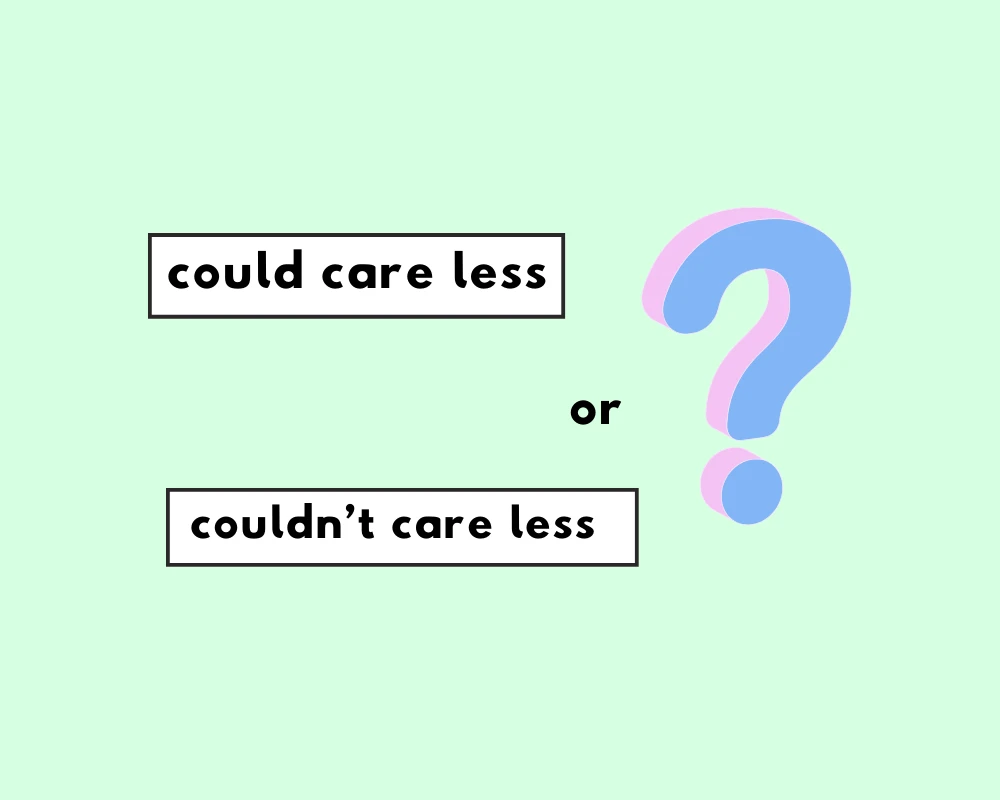Can you care any less? If so, then “I could care less“, suits.
Otherwise, it’s “I couldn’t care less” : as in, there is no lesser extent to which you could care. You are entirely indifferent on the matter.
“Couldn’t care less” vs. “could care less “
When asked about the latest celebrity gossip, Sarah just shrugged and said, “I couldn’t care less.” (This correctly expresses complete indifference; there is no lesser extent to which she could care.)
The outcome of the minor league game? Honestly, we couldn’t care less; we’re just here for the hot dogs.
He claimed to be completely unaffected by the criticism, saying, “I could care less about what they think.” (This incorrectly uses “could care less” when the speaker intends to express total indifference. Saying “I could care less” implies he *does* care a little, and could care even less than that.)
My brother said he was so bored with the movie that he could care less if we turned it off.
To quote the Good book, Strunk & White on the topic (from the section on frequently misused words and phrases).
The dismissive “I couldn’t care less” is often used with the shortened “not” mistakenly (and mysteriously) omitted: “I could care less.” The errors destroys the meaning of the sentence and is care less indeed.
Shall I repeat that “the error destroys the meaning of the sentence”. An egregious offence indeed. So, unless you want to raise the hackles of Strunk, White, Wren and the other founding fathers of grammar, include the “not” (that is, unless you do actually care a bit).
Note: some online dictionaries (such as Collin’s Dictionary, and Dictionary.com) do recognize “could care less” as an expression with the same meaning as “couldn’t care less”. From Collins Dictionary: “In American English, you can also say that you could care less, with the same meaning.”
About the outcome of the game, I couldn’t care less.
She told him she couldn’t care less what he thought of her new haircut.
Honestly, I could care less about his drama.
He claimed he could care less about the election results, but his anxious pacing suggested otherwise.
What the sources say on the matter
The question is one that gets people, (especially grammarians and English teacher) very hot and bothered, though for good reason. Let’s see what the sources have to say on the topic, starting with Britannica:
Both phrases are used to mean someone doesn’t care at all, but English teachers and grammarians will say that only “couldn’t care less” is correct, so that is what you should use in formal or academic writing.
Dictionary.com’s hot take:
Dictionary.com lexicographers aim to record language as it is actually used, without judgment, so you’ll find definitions for both … here.
Language, as it is actually used, sometimes includes common errors that we ought to avoid (like ‘could care less’). Ostensibly, the term is an idiom, and idioms need not adhere to logic; therefore, the phrase doesn’t have to make sense (this is according to Dictionary.com).
If you want to communicate well and unambiguously, our consensus is avoid ‘could care less’; particularly for any formal writing or business contexts. In conversation, it’s ultimately a personal preference, but just know that from a purely logical standpoint, the phrase means the opposite of what people intend it to mean.
“Couldn’t care less”, used in sentences
I couldn’t care less about the new game coming out.
I started to get irritated by this couldn’t-care-less attitude.
He couldn’t care less about football.
Personally, I couldn’t have cared less whether the ice-cream came from Italy or England.
To remember which phrase to use, focus on the “not.” If you mean you have *zero* interest or feeling, you *couldn’t* care *less* – because you’re already at the absolute minimum level of caring. If you say “I could care less,” you’re implying you *do* care a little, and it’s possible to care even less than your current (small) level of concern. Always aim for “couldn’t care less” when expressing complete indifference.
Couldn’t care less (synonyms)
- indifferent
- neutral
- uninterested
- callous
- stoic
- apathetic
- unconcerned
- not give a tinker’s dam
Read about other misused words
Sources
- The Elements of Style, Strunk & White.
Work Sheet
According to the blog post, which phrase is the correct way to express complete indifference?
Prescriptively, what does the phrase “I could care less” imply?
According to the blog post, what key element is omitted when “I could care less” is used mistakenly for total indifference?
Which sentence uses the phrase correctly according to the prescriptive rule discussed in the blog post?
The blog post states that omitting the word ‘not’ in the phrase for total indifference _______ the meaning of the sentence.
If you are entirely indifferent on a matter, you _______ care less.
According to the prescriptive view, saying you “could care less” implies you actually care a little, and that you _______ care less than you do now.
When expressing that your interest level is at its absolute minimum, you should say you _______ care less.
The phrase “I couldn’t care less” properly conveys that there is no _______ extent to which you could care.
The blog post recommends following prescriptive grammar rules which prefer “I _______ care less” for expressing complete indifference.
Frequently Asked Questions
What means total indifference?
+
What does “I could care less” mean?
+
Which phrase is preferred for indifference?
+
Is using “could care less” an error?
+
Do dictionaries accept “could care less”?
+
Yash, D. "“I Couldn’t Care Less” or “I Could Care Less”." Grammarflex, Jun 6, 2025, https://www.grammarflex.com/i-couldnt-care-less-or-i-could-care-less/.











